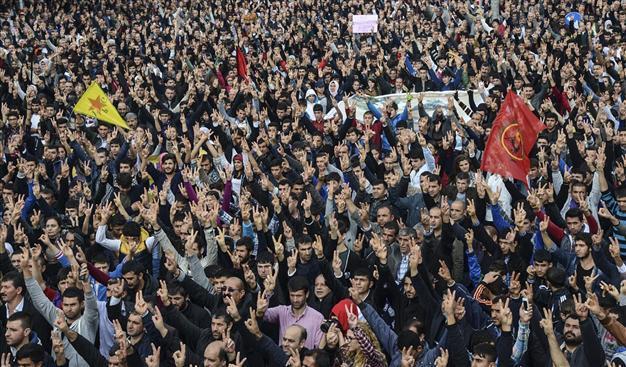Turkey’s Kurdish peace process at a turning point: International Crisis Group
ISTANBUL / BRUSSELS

Kurds gesture the V-sign as they gather on Nov. 1 in Diyarbakır during a rally in support of Kobane. AFP Photo / İlyas Akengin
The peace process between Turkey and the outlawed Kurdistan Workers’ Party (PKK) is at a turning point and both sides “need to articulate realistic end goals,” according to the International Crisis Group’s latest report, which also details the parameters of a possible peace deal.“The peace process ... is at a turning point. It will either collapse as the sides squander years of work, or it will accelerate as they commit to real convergences,” said the report, titled “Turkey and the PKK: Saving the Peace Process,” released on Nov. 6.
The International Crisis Group states in the report that basic issues such as transitional justice, disarmament and decentralization need to be more broadly and deeply discussed so that public opinion on both sides begins to accept compromises that will be necessary to end the violence.
The report also stated recommendations for a possible peace deal between the PKK and the Turkish government as following:
- The two sides need to articulate realistic end goals, end abusive rhetoric and implement reforms to ensure Kurds enjoy full rights as Turkey’s citizens.
- On a second track of secret talks in progress since late 2012, the two sides must negotiate a deal that includes disarmament, which for now can only be inside Turkey; conditions for an amnesty that is broadly palatable and legally unchallenged; an independent truth commission reporting to Parliament; and a transitional justice mechanism to deal with abuses by both sides.
- The government must further build up the legal and political framework for a peace deal, allow a united PKK negotiating team under jailed PKK leader Abdullah Öcalan, agree compensation for the state’s past wrongdoings, and continue to legitimize scenarios – once all violence ends – in which PKK figures can join legal Kurdish parties in Turkey and even Öcalan can hope for freedom.
- The PKK needs to convince Turkish, Kurdish and international opinion that it can be a democratic political actor, ready to fully disarm, at least inside Turkey’s borders. It also needs to accept that it does not represent the majority of Kurds.
The report also said the PKK and Turkey cannot cooperate against “their common enemy the jihadi threat,” in the country’s southern neighbor of Syria before achieving peace between themselves.
Increasing cease-fire violations, urban unrest and Islamist extremism spilling over into Turkey from regional conflicts underline the cost of delays, said the report, also calling on both sides to focus on the chief problem, “the conflict inside Turkey.”
“The two sides should not let old reflexes and daily news distract them from focusing on resolving their main conflict inside Turkey,” said Hugh Pope, Europe and Central Asia Deputy Program Director. “Without first achieving peace at home, both will remain highly vulnerable to what is in fact their common enemy, the Islamic State [of Iraq and the Levant, ISIL] in Iraq and Syria.”
“Despite a recent rise in hostilities, particularly in southeastern Turkey, the process has proved to be useful for the entire country and should not be jeopardized to score short-term political points with hardline Turkish and Kurdish constituencies,” said Didem Akyel Collinsworth, International Crisis Group's Turkey Senior Analyst.
“But to achieve sustainable peace, it needs a more comprehensive agenda, a more urgent timeframe, better social engagement, mutually agreed ground rules, and clear and objective monitoring criteria,” she added.
















